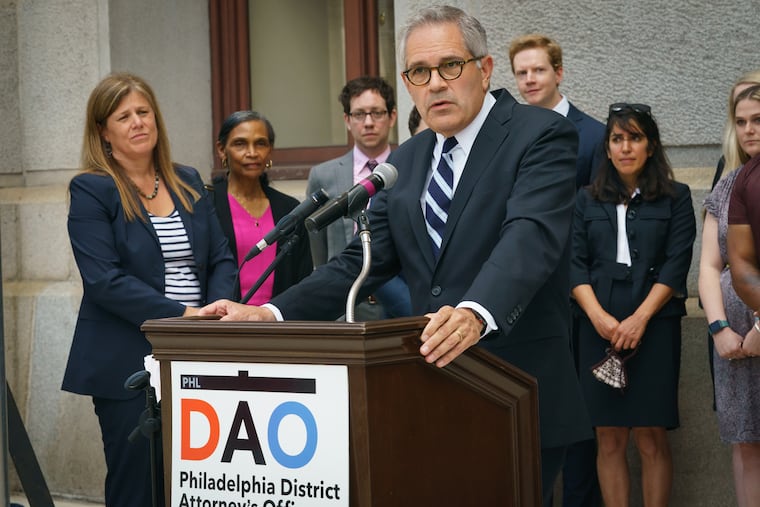A second Pa. district attorney sues AG Shapiro’s office over opioid settlement
District Attorneys for Philadelphia and Allegheny County, home to Pittsburgh, now oppose an opioid settlement crafted in part by Pa. Attorney General Josh Shapiro.

Allegheny County District Attorney Stephen Zappala Jr. is following the lead of Philadelphia DA Larry Krasner in suing Pennsylvania’s attorney general over a proposed opioid settlement.
The two district attorneys’ offices are among dozens of local government entities in Pennsylvania that brought lawsuits against drug companies and distributors in state court, accusing them of fueling the opioid crisis — claims that the companies have denied.
Zappala, whose jurisdiction includes Pittsburgh, the state’s second most populous city, is now the second DA in the state to say, through another lawsuit, that he does not want to give up his county’s opioid litigation. The two rejections come as Pennsylvania Attorney General Josh Shapiro touts a $26 billion proposal to settle thousands of opioid claims nationwide.
Shapiro says the settlement with three distributors and a drug manufacturer could deliver as much as $1 billion to Pennsylvania over 18 years, with $232 million coming by next year.
Krasner has called the deal a “sellout” that would bring $5 million to $8 million a year to Philadelphia, arguing that’s not nearly enough for a city hard hit by drug overdoses.
» READ MORE: The pandemic broke through opioid treatment red tape. Let’s keep it that way. | Opinion
Similar to a suit Krasner filed against Shapiro on July 22, Zappala is asking a court to declare that Shapiro’s office cannot relinquish Allegheny County’s claims against certain companies as Shapiro pursues the settlement. Zappala filed the suit July 29 in the Commonwealth Court of Pennsylvania.
“What the attorneys general have got is not enough,” Krasner said at a news conference Monday. “I’m not seeing a reason why any big city mayor or any substantial DA’s office would drop their lawsuit. If you care about the people who voted for you, the jurisdiction you serve, you should be standing up.”
In a statement issued Monday, Zappala said that “accepting a contingent settlement of possibly a few million dollars is not suitable.”
“Such a settlement doesn’t begin to address the hundreds of millions of dollars of damage inflicted and thousands of lives that have been destroyed throughout Allegheny County,” Zappala said.
Both Krasner’s and Zappala’s suits focus specifically on a $21 billion settlement agreement with three major pharmaceutical distributors, and do not encompass an additional $5 billion agreement with drugmaker Johnson & Johnson.
The distributors are Conshohocken-based AmerisourceBergen, Texas-based McKesson, and Ohio-based Cardinal Health. In a joint statement last month, the three firms said that although they “strongly dispute” allegations of wrongdoing, they believe the settlement could help deliver “meaningful relief to communities across the United States.” AmerisourceBergen did not have additional comment Monday, and the two other companies did not immediately respond to requests for comment.
Shapiro’s office has said the settlement proposal doesn’t prevent jurisdictions such as Philadelphia and Allegheny County from pursuing their own claims in court. But his office has argued that the settlement comes with financial certainty, while continued litigation by municipalities runs the risk of netting nothing.
“This is a copycat of a Philadelphia lawsuit that misleads Pennsylvanians and would rob Allegheny County residents of their fair share of a billion dollars to fight the opioid epidemic,” AG spokesperson Molly Stieber said of Zappala’s suit. “The DA’s plan is to start years of risky, drawn-out litigation that would deny Western Pennsylvanians the treatment options they need now, with no realistic plan for success.”
Pennsylvania counties and townships have about five months to decide whether to join the settlement. The more municipalities sign onto the agreement, the more money Pennsylvania will receive under the settlement framework. The funds must be spent on treatment options, according to Shapiro’s office.
Krasner’s suit against drug distributors and manufacturers is one of four test cases designated by a state court that could go to trial fastest in Pennsylvania. No trial date has been set yet.
Since 1999, about a half-million people have died in the U.S. from overdoses involving prescription and illicit opioids, according to federal data. Last year in Philadelphia, 1,214 people died of drug overdoses — one of the worst death rates in the country, and driven by illicit fentanyl, a synthetic opioid that has contaminated most of the city’s heroin supply.
Krasner’s office came up with the settlement estimate of $5 million to $8 million a year by taking into account factors such as the number of pills sold here, the number of people with opioid use disorder, and the number of overdose deaths in Philadelphia. His office also considered how funds for treating substance use disorder are distributed around the state in general, as well as how funds in similar settlements are allocated.
Philadelphia City Councilmember Mark Squilla, whose district includes parts of Kensington, the city’s epicenter for drug overdoses, said his constituents are suffering, and he supports Krasner’s fight in court so Philadelphians can “get their fair share.”
“We need that money,” Squilla said. “And we need resources to make a difference.”